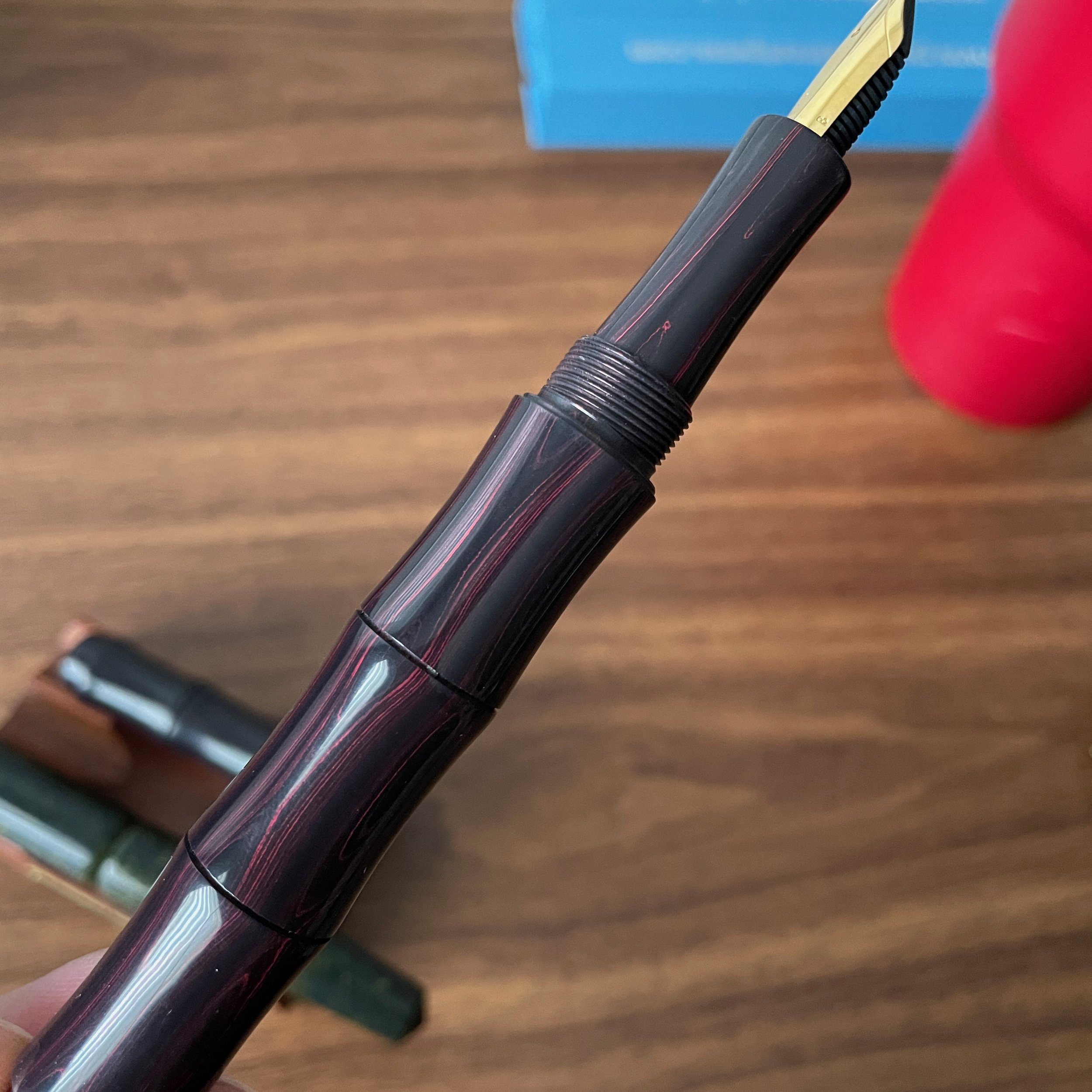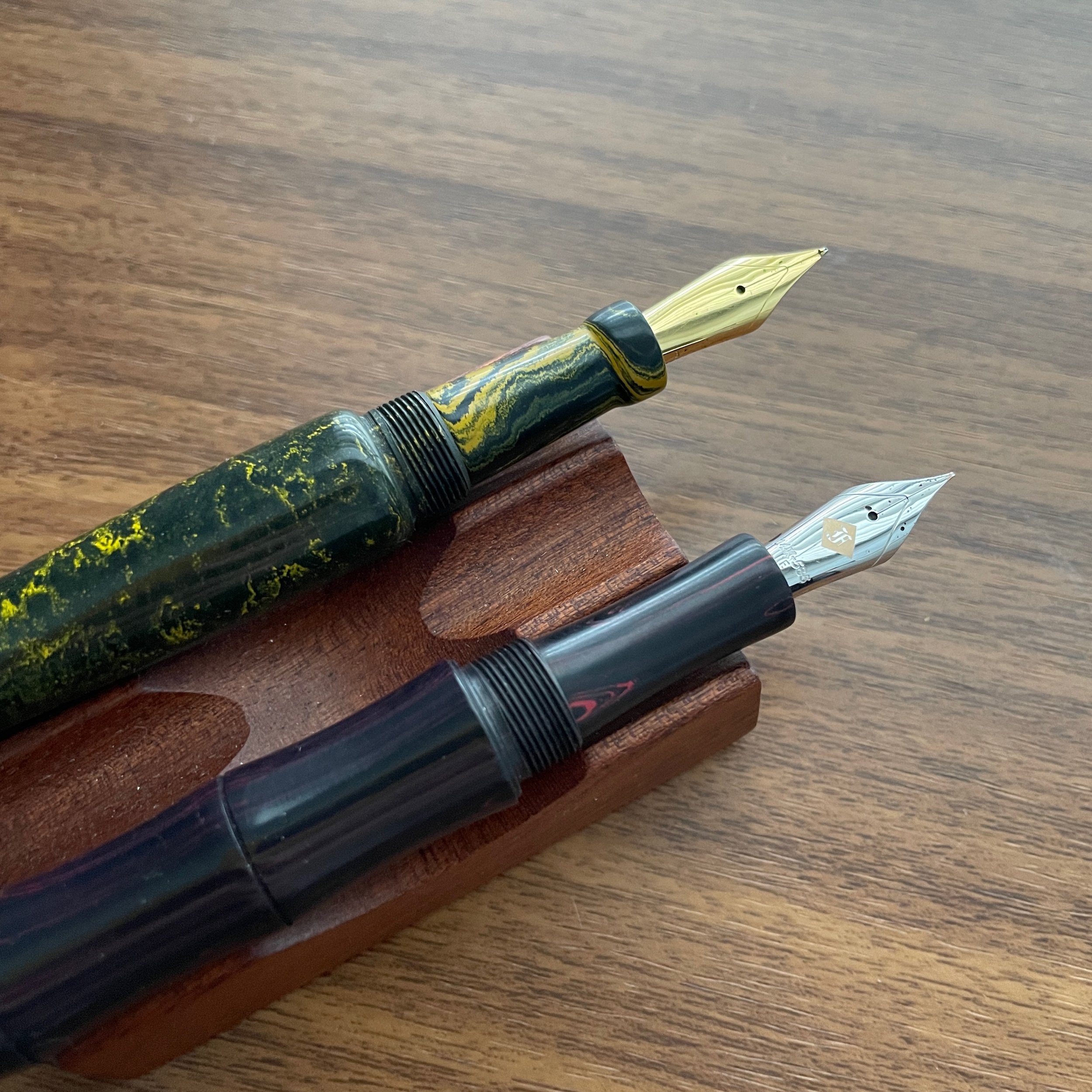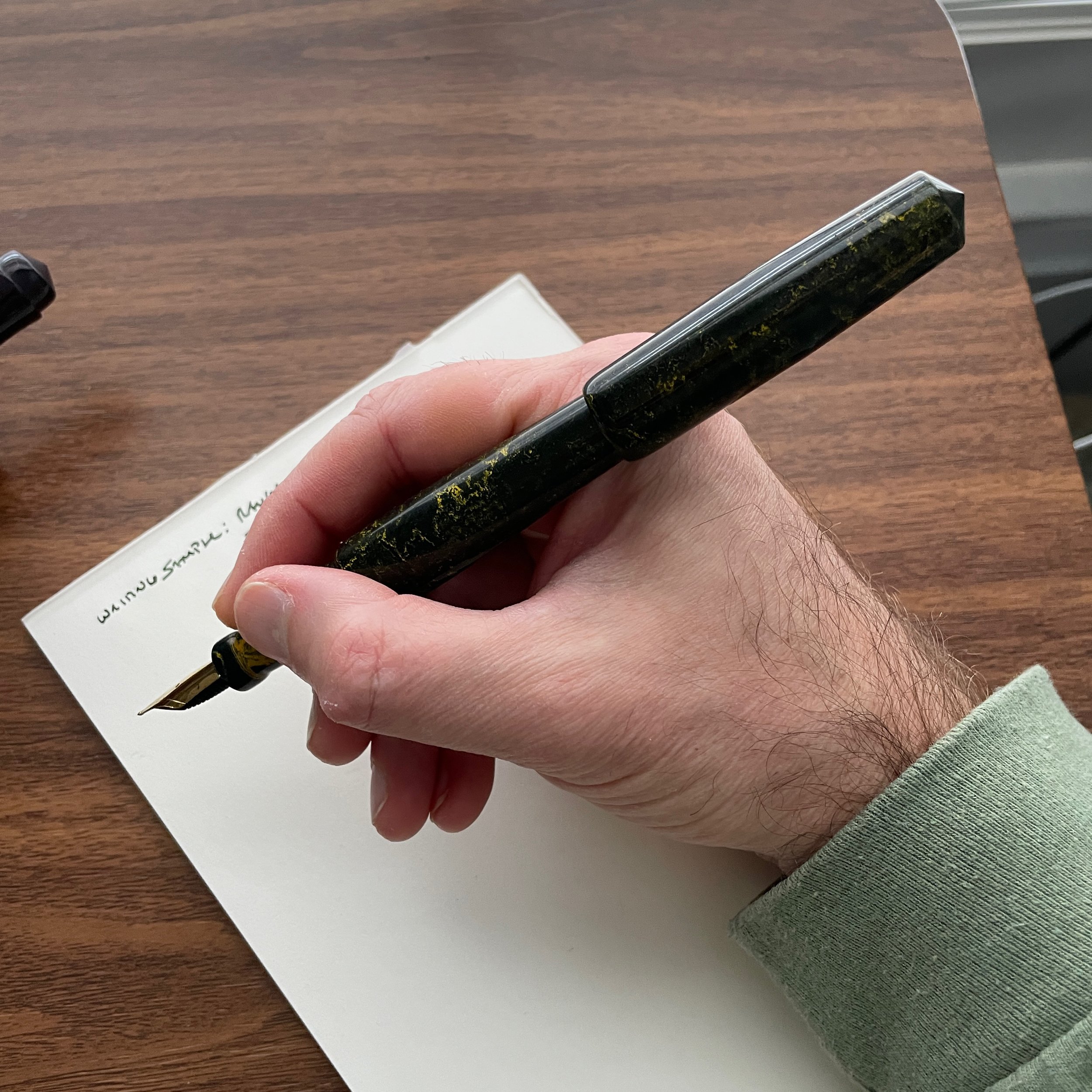As the years go by, it gets harder to write truly fresh review content because, eventually, you get to a point where you’ve reviewed most major pen brands and you learn that much of what is released into the market is either duplicative of something else a company has already released (i.e., a “limited edition” that’s simply a different color) and/or that even most “new” designs are derivative of others. Having done this for going on nine years, it’s rare that I find an entire brand that I’ve never reviewed, much less tried, but for some reason that’s how it ended up with Ranga.
Premium red woodgrain (sometimes called “rosewood”) ebonite: one of my favorite materials.
Ranga is a family-run Indian manufacturer that has been hand-making pens for more than 50 years, and has sold through various retail outlets in the United States. Currently, their main U.S. retailer is Peyton Street Pens, whom I always visit at the San Francisco Pen Show. Teri and Nivardo have a ton of unique finds at their table, including exclusive designs and custom nib grinds that they offer on their pens. I’ve admired the selection of Ranga ebonite pens before, but never had money left in the budget at the end of the show to take one home. That changed this year, especially since I found myself short of pens to fill a nib grinding appointment with C.Y. of Tokyo Station Pens.
The Ranga Abhimanyu (left) compared against the Ranga Bamboo (right)
Ranga Abhimanyu and Ranga Bamboo
I chose two very different Ranga models to test: the Abhimanyu, which is a smaller streamlined fountain pen with peaked ends somewhat reminiscent of a Nakaya Piccolo but with a more pronounced shape; and the Bamboo, which, as you might have guessed, is shaped like a piece of Bamboo. I opted for premium ebonite on both pens, with the Abhimanyu featuring a black and yellow pattern (which combined looks almost dark green) and the Bamboo a red woodgrain pattern (which I’ve seen described as “rosewood” elsewhere).
The sections on both of these Ranga pens are exceptionally comfortable.
The Abhimanyu and Bamboo fountain pens are distinctive designs, so you can’t really compare them. I personally love both, but one design/shape may appeal to you more than others, and if neither of these does it for you, Ranga has close to a dozen more different shapes and sizes available. I will say that the fit and finish on both pens is exceptionally good for the price point. It’s almost unheard of to find handmade, premium ebonite fountain pens of this quality for $100 or less. As you might expect, the pens are cartridge-converter, but like most ebonite pens they are safe to eyedropper provided that you apply silicone grease to the threads.
The Ranga Abhimanyu, unposted in-hand.
I can’t pick a favorite. The Abhimanyu probably lends itself more to everyday writing, since it’s a compact pen that slips easily into a pen case or sleeve, plus it caps and uncaps with two turns, as opposed to the Bamboo which can take a bit of effort due to the longer section. The Abhimanyu also posts, though not deeply and some may find the posted pen unwieldy. The Bamboo makes an excellent desk pen, and I’ve been using it for longer journaling sessions at night and also for longhand drafting when working from home.
The Ranga Bamboo in-hand. This pen does not post. (Technically, it can, but it’s ridiculously long and I can’t imagine anyone can actually use it this way.)
Writing Experience
I would consider Ranga fountain pens “user grade” pens in the best sense: They are exceptionally comfortable for longer writing sessions, mainly due to the length and shape of the section. On both models, the longer section offers plenty of room to grip the pen without running afoul of the threads, and on the Bamboo in particular, the grip area is slightly concave, which I find helps compensate for the weight of the larger body and gives the pen a nice balance. Ranga pens all take standard No. 6 JoWo nib units, so you can use the included nib as shipped, easily have the nib ground, or swap in another JoWo nib unit from a brand such as Franklin-Christoph, which I did here on the Bamboo.
Ranga Abhimanyu posted. The pen is long, but the cap is extremely lightweight so I can use it comfortably as needed.
Takeaways and Where to Buy
I’ve become something of an ebonite pen enthusiast over the years, with multiple pieces in my collection ranging from lacquered Nakayas to a custom Shawn Newton Prospector to the Nahvalur Nautilus piston filler. Ebonite has a feel to it that is difficult to duplicate elsewhere, reminiscent of the warmth of vintage celluloid (though much less expensive). Opting for ebonite over the more common acrylic or resin can allow you to purchase a unique looking pen with a premium feel at an exceptional value - both of the Ranga fountain pens shown here cost $100 or less. The Bamboo in premium ebonite sells for $100, while the Abhimanyu in premium ebonite retails for $89. Standard ebonite versions are $80 and $72, respectively, with some acrylics also offered. Suffice to say, both models have impressed me and I won’t hesitate to pick up another Ranga if a pen jumps out at me in San Francisco this year.
Most of my ebonite pen collection, clockwise from top: Peyton Street Pens Custom by Teri, “Navigator by Stacey Robinson, Nahvalur Nautilus in Stylophora Berry; Nahvalur Nautilus Pen Show Edition 2022; Ranga Abhimanyu; Ranga Bamboo; Shawn Newton Prospector in Nikko Ebonite.
Ranga pens can be purchased in the U.S. from Peyton Street Pens, where I acquired the pens pictured in this review. To the extent Peyton Street doesn’t have exactly what you’re looking for, you can also order directly from Ranga in India via their website.
I purchased the pens featured in this review with my own funds. The Gentleman Stationer is supported entirely by purchases from the T.G.S. Curated Shop and pledges via the T.G.S. Patreon Program. Learn more about T.G.S. Patreon here, and don’t miss our periodic “Gently Used” sales.


